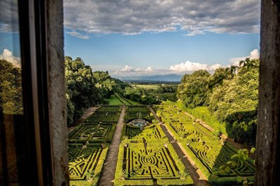Review: Juilliard Makes Handel's AMINTA E FILLIDE the Opera of the Year

one of the Ruspoli gardens in Rome, like this one.
Handel's AMINTA E FILLIDE (ARRESTA IL PASSO) doesn't have much of a libretto--"nymph meets swain and complications arise," says the program, and that's about it. And, there were just a handful of musicians from Juilliard's early music program on stage at the Morgan Library's tiny Gilder Lehrman Hall to perform the work.
Yet Handel's opera/pastoral/cantata goes on my list as one of the most gorgeous performances of the year in New York, thanks to the stellar young musicians of Juilliard's Historical Performance program, under guest artist-in-residence, William Christie. And the audience of about 250 lucky listeners for each of two performances, last weekend, which lasted less than an hour, heartily agreed.
If you've heard enough Handel--particularly RINALDO and AGRIPPINA (which makes it to the Met, knock on wood, shortly)--you'd probably recognize some of the music in AMINTA, which the composer reused. (Handel knew a good tune when he heard it--even if he wrote it himself.)
It's hard to imagine what the reaction to the piece must have been like when it premiered, with its dazzling array of arias and duets (including 'Fiamma bella' and 'Se vago rio') and brilliant instrumental work. Handel was just 22, during his short sojourn in Rome, when he was commissioned to write this chamber piece for a meeting of the city's Arcadian Academy. They were fed up with the ridiculous complexities of 17th-century opera and proposed a new simplicity and restraint, a return to the pastoral style. AMINTA was performed in the garden of a palazzo just east of the Colosseum in 1708.
"Simplicity"? That's putting it mildly, though the composer couldn't resist throwing in some Baroque touches. Even as the passionate youth, Aminta, invokes "il dio bambino col strale suo divin" (the Christ child with his divine arrows) to win the reluctant, disinterested Fillide's heart, there wasn't much action here, except a bit of to-ing and fro-ing (and some flirting by soprano Shaked Bar with Christie). But it didn't matter a bit.
The piece filled the hall with the kind of music and expertise that we just don't get enough of hereabouts. (The preparation coaches were Corradina Caporello for language, David Moody for music.) There were just two marvelous young singers, sopranos Bar and Jessica Niles, who dazzled and charmed at every turn, with their pure voices (of different timbres) and honest acting, and dead-on intonation.
Alongside them were 12 clear-focused, superbly balanced instrumentalists (including Christie on one of the two harpsichords) who pulled the piece along, as if plucking it from heaven. The half-dozen violins, two cellos, double bass, the ever-present theorbo and pair of harpsichords, not only played well but fell into the fun of the piece.
Don't get me wrong: I love lots of new music and heartily support living composers and librettists as vital to musical life in New York (and elsewhere, of course). But to think about casting aside the kind of work that the Juilliard415 period instrument ensemble and the wonderful singers from the Marcus Institute for Vocal Arts showed us, all under harpsichordist-conductor-musicologist-teacher (have I left anything out?) Christie, would be a crime. This is especially true after the kind of performance that I was privileged to witness at the Morgan's elegant Renzo Piano-designed concert hall.
Add Your Comment
Videos


